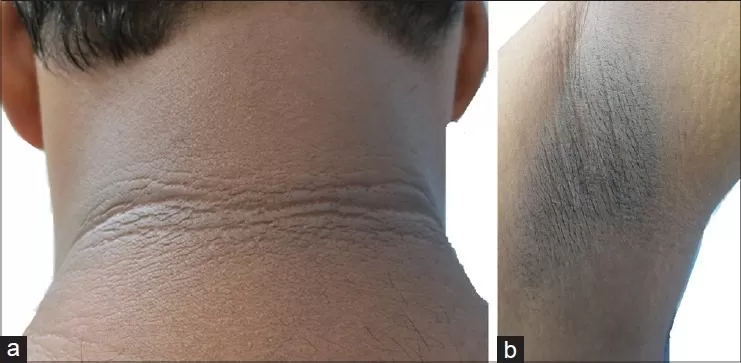Skin Darkening Around Your Neck? It Might Be the First Sign of a Major Health Issue

Acanthosis nigricans (AN) is a skin condition characterized by dark, velvety patches, typically appearing in areas where skin folds, such as the neck, armpits, groin, and sometimes hands or elbows. While it may seem like a cosmetic concern, acanthosis nigricans is often a sign of underlying health issues that require attention.
What Is Acanthosis Nigricans?
Acanthosis nigricans is not a disease in itself but a marker that may indicate various health problems. The darkened skin patches often develop slowly, thickening over time. These areas can also become itchy or develop an odor, but they are typically painless.
Dr. Neha Sharma, a dermatologist at CareSkin Clinic, explains, “Acanthosis nigricans is a skin condition associated with insulin resistance, obesity, and hormonal disorders. While it’s relatively common in individuals who are overweight, its sudden appearance should raise red flags about potential health risks, especially related to metabolic syndrome and diabetes.”
Acanthosis Nigricans as a Warning Sign for Diabetes and Insulin Resistance
One of the most well-established connections between acanthosis nigricans and health is its link to insulin resistance. The condition frequently appears in individuals who are prediabetic or diabetic, as excess insulin in the bloodstream can affect skin cells, leading to pigmentation changes.
“Acanthosis nigricans can be one of the earliest signs of insulin resistance,” says Dr. Meera Jain, an endocrinologist at Global Health Institute. “If a patient comes in with this skin condition, we recommend immediate blood sugar testing, as managing blood glucose levels may help control the skin issue and prevent the onset of type 2 diabetes.”
Obesity and Hormonal Imbalances
Obesity is another major factor associated with acanthosis nigricans. The presence of excess fat tissue can cause hormonal changes that lead to insulin resistance. Additionally, obesity-related acanthosis nigricans tends to improve when individuals lose weight.
This skin condition is also tied to hormonal imbalances, including polycystic ovary syndrome (PCOS), thyroid disorders, and even some forms of cancer. According to Dr. Sharma, “We often see acanthosis nigricans in women with PCOS, where insulin resistance plays a central role. Hormonal evaluations are crucial for managing this condition.”
Rare Causes: Cancer and Medications
Although less common, acanthosis nigricans can also be linked to more serious health issues, such as stomach or liver cancer. In these cases, the skin changes occur rapidly and may be more widespread. Medications like oral contraceptives, corticosteroids, and high doses of niacin have also been reported to trigger acanthosis nigricans in some individuals.
Dr. Rajesh Menon, an oncologist at City Medical Center, adds, “When acanthosis nigricans develops suddenly in an otherwise healthy individual, and there’s no clear link to obesity or insulin resistance, we investigate for malignancies, particularly gastrointestinal cancers. Early detection is key.”
Diagnosing and Treating Acanthosis Nigricans
Diagnosis is usually straightforward through physical examination, but underlying causes must be identified to treat the condition effectively. Blood tests to check for diabetes, hormone levels, and other possible disorders are common steps in the diagnostic process.
When it comes to treatment, managing the root cause is critical. For insulin resistance or prediabetes, lifestyle changes such as weight loss, exercise, and diet adjustments can help. If medications are the cause, a doctor may adjust the prescription. Topical treatments such as retinoids or prescription creams may also help lighten the skin, but they do not address the underlying health issue.
A Call for Awareness
Acanthosis nigricans is not just a skin problem. It’s a signal from your body that something may be wrong. “People often ignore dark patches on their skin, thinking it’s just a cosmetic issue,” warns Dr. Sharma. “But this condition often serves as an early indicator of metabolic disorders that need medical attention.”
Acanthosis nigricans may not be harmful on its own, but its presence often points to larger, systemic health concerns like diabetes, obesity, and even cancer. Recognizing this skin condition early and seeking medical evaluation can lead to timely diagnosis and management of potentially serious underlying issues. As Dr. Jain emphasizes, “Don’t dismiss it as a cosmetic concern. Acanthosis nigricans is your body’s way of asking you to take your health seriously.”
Key Takeaways:
- What is it? A skin condition causing dark, velvety patches, often in body folds.
- Common causes: Insulin resistance, obesity, hormonal imbalances.
- Rare causes: Certain cancers and medications.
- Diagnosis: Based on physical examination and tests to identify underlying health issues.
- Treatment: Focuses on addressing the root cause, including lifestyle changes for insulin resistance and weight loss.
Disclaimer: The information provided in this article is for educational purposes only and should not be considered as medical advice. Always consult with a qualified healthcare professional for accurate diagnosis and treatment of any health conditions






